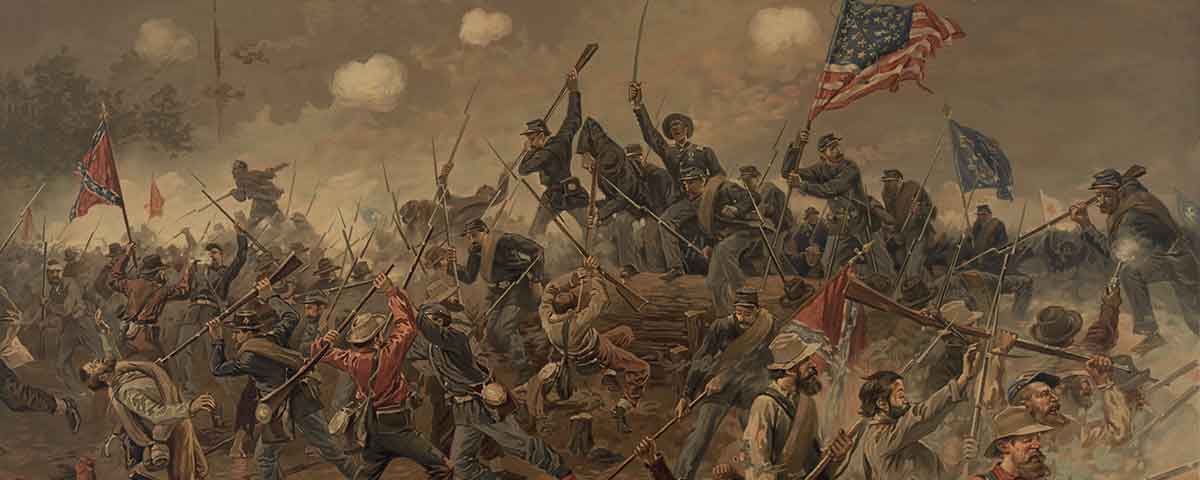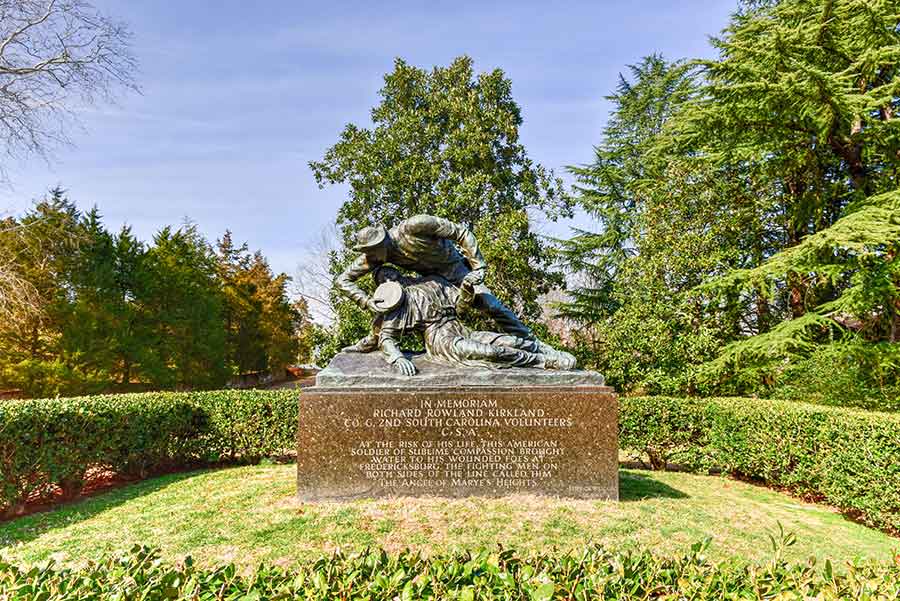Spotsylvania grunts get their say
Folks sometimes ask me what sets Virginia’s Fredericksburg & Spotsylvania National Military Park apart from other hallowed grounds. I remind them that if you visit battlefields such as Gettysburg, Antietam, or Manassas, you will see giant equestrian statues memorializing the commanders at these engagements: Lee, Jackson, Longstreet, Meade, Reynolds—stone sentinels dominating the landscape. But when you visit the fields at Fredericksburg, you will see no such monuments. In fact, the only statue on the battlefield proper is Richard Kirkland’s “The Angel of Marye’s Heights” monument, which depicts two common infantrymen. Spotsylvania Battlefield is also vacant of these marquee statues.
Although recognized officers on both sides were present during these battles, it is the contributions of the common soldier that are commemorated. The grunts get the credit, and it is their stories, recorded in letters home, that need to be shared.
Our first recollection comes from Michael F. Rinker of Company F, 136th Virginia Militia, who wrote to his parents a few weeks into the Overland Campaign:
Camp Near Spotsylvania Court-House Va
Tuesday May the 17th 1864
Dear Father and Mother …Today it is 14 days since we commenced fighting and yesterday the cannon and small arms were still at work….[T]he hardest fighting was on the 5, 6 & 7 and on the 9, 10 & 11 days of this month. During them six days it was awful.…For six days the Battle was kept up, all the time day and night, in the dead hour of midnight, the cannon & musketry was thundering all the time. Column after column the Yankees pushed their men up to our Breastworks and our men were cutting them down as fast as flies. The dead Yankees are heaped up in piles half as high as a man, in front of our Breastworks, and all around on the Battlefield the dead yanks are lying just as thick as they can be, and none of them buried, they will all rotten on top of the ground….All the men say that this has been the hardest fight [of] the war. We have plenty to eat. Noah give me the things that you sent to me and I am very much obliged to you for them….Tell mother, I would like to have one pair of socks sent to me by the first one of our men that comes over…
Your son, Mike.
Private Walter Battle of the 4th North Carolina Infantry recounted some of the fighting in this letter:
The Yankees held a position on our right, upon a hill which enabled them to keep up an incessant enfilading fire upon us; two thirds of the men we lost were done in that way. Men were killed while squatting just as low and as close to the breastworks as it was possible for them to get….It was a wonder to me that the last one of us was not killed.
Wrote Battle on May 14:
Last Thursday though is the day that will be remembered by both armies as long as one man is left to tell the tale. At daylight they attacked the line a little to our right, drove our men out of both lines of breastworks and the result was hanging in the scales when our brigade was taken from one position and moved around in front of them….There is not a man in this brigade who will ever forget the sad requiem which those minie balls sung over the dead and dying for twenty-two long hours; they put one in mind of some musical instrument; some sounded like wounded men crying; some like humming of bees; some like cats in the depth of the night, while others cut through the air with only a “Zip” like noise….Brigadiers and colonels lay as low in the trench and water as the men….I am too worn out to write anything of any interest. I am about half deaf yet, as is everyone else from the effects of the cannonading.
A letter the wife of 3rd South Carolina Lieutenant Isaac Newton Cooper received shortly after the Spotsylvania fighting reinforces the tragedy of war:
It becomes my painful duty to inform you that your husband…was mortally wounded on the 8th of May….[I]t will indeed be painful intelligence to you and his children to learn of your great loss—he was wounded in the head by a bomb shell and has been lying insensible ever since. The Surgeon thinks he will die in a few hours. I was in hopes at first that he would recover…but he is getting worse. He was a true friend to me and a brave officer…
On May 10, 11th Mississippi Infantry courier James Montgomery was struck by a shell fragment while delivering communications for Maj. Gen. Henry Heth. As he lay dying, Private Montgomery wrote to his father:
Spotsylvania County, Va. May 10
Dear Father This is my last letter to you. I went into battle this evening as courier for Genl. Heth. I have been struck by a piece of shell and my right shoulder is horribly mangled & I know death is inevitable. I am very weak but I write to you because I know you would be delighted to read a word from your dying son. I know death is near, that I will die far from home…but I have friends here too who are kind to me. My friend Fairfax will write you…and give you the particulars of my death. My grave will be marked so that you may visit it if you desire…but it is optionary with you whether you let my remains rest here or in Miss.
I would like to rest in the grave yard with my dear mother and brothers but it’s a matter of minor importance….Give my love to all my friends. My strength fails me. My horse and my equipments will be left for you. Again, a long farewell to you. May we meet in heaven.
Your dying son, J.R. Montgomery
Living in Virginia, we are all blessed to live in a state so rich in Civil War history. With all these expertly restored historical places surrounding us, it is very easy to forget the hardships and carnage that took place here. We must consciously remind ourselves that the beauty that surrounds us is a façade and that the men who fought and died here baptized the soil with their blood. We can do this by preserving and presenting their words for future generations. Only then will we truly acknowledge the memory of the common Civil War soldier and give them their proper place in our nation’s story.
Michael Aubrecht is a former private Fredericksburg & Spotsylvania National Military Park guide and author of The Civil War in Spotsylvania County: Confederate Campfires at the Crossroads (The History Press, 2009). This blog post was adapted from his May 8, 2012, presentation before the Richmond Civil War Roundtable.






